What is stage fright?
This it seems safe to say this is an anxiety based condition
I will mainly talk about people giving a workshop or some kind of public speaking as I have dealt with this mainly, including my own public speaking. However I have dealt with many others over the years who present the problem of stage fright in a wide variety of areas. For instance I knew a woman who plays the guitar and she used to get very anxious before any performance and used to take Beta blockers before auditions.
That is one solution to stage fright, some kind of anti anxiety medication. I recall another client who was very religious and had strong views against drugs or alcohol of any kind. She had to give a presentation in a tutorial to fellow university students. I recall being surprised when she said that before the tutorial she dank a glass of beer. She was that anxious that she dropped her views on alcohol to deal with the fright. This demonstrates just how significant stage fright or performance anxiety can be for some people.
I think it is fair to say that every person who does some kind of public presentation suffers stage fright to some degree. The Free Child ego state will naturally be nervous as you are performing to some degree. You are up there in front of an audience who are all looking at you and who will make a judgement of you of some kind.
For some however the anxiety is neurotic in that it is beyond the normal degree of stage fright or has some other psychological meaning. People who present for stage fright or public speaking anxiety in counselling usually have all sorts of thoughts and produced many scenarios about how the audience will negatively asses them. Interestingly however, stage fright has little to do with them (the audience) and much more to do with you. In most cases the audience is somewhat irrelevant to what is going on psychologically.
There is a small group who suffer stage fright because of a problem in the Child ego state of the presenter. In this case the person has significant doubts about their own worth or OKness. They feel bad as a person in themselves. In their mind they start to link performance with OKness such that if they perform badly then that proves they are a bad person or their sense of personal worth is diminished.
This person can suffer very badly from performance anxiety because each time they go out and perform their very sense of self worth is on the line. Whilst this does occur I would say that this is a small group of sufferers of stage fright. Most sufferers usually have an active internal Critical Parent ego state which they project onto the audience. This is why I say stage fright has much less to do with the audience than the performer them self.
When a client says the audience will think they are bad, performed poorly or give them a highly critical assessment I usually respond with - “Some will and some wont”. Those in the audience with a high CP will give a critical assessment no matter how good you are and those with a low CP will give a non critical assessment no matter how bad you are. (This is to be distinguished from an Adult ego state assessment which audience members can also make, however this is not usually what the stage fright person is anxious about.)
Stage fright is about how much CP the performer has in their own mind. Usually those who come from a background with highly critical parents often have their own high CP and those with less critical parents will have a lower CP and suffer less performance anxiety.
Dealing with stage fright is about
Increasing internal NP
Reducing internal CP
Developing a strong A
Making sure the Child feels OK about self such that its OKness is not linked with performance.
After a presentation of a workshop or performance of some kind one needs to use their Adult to make an assessment and hence a robust Adult is most useful. Sometimes you do well and sometimes you don’t do so well. An Adult ego state assessment allows the presenter to get better and learn from each presentation they do. It is important to assess self but it must be an Adult assessment and not a CP assessment.
Finally there is a related type of stage fright that is solely a male condition. Indeed, it is often referred to as stage fright. Some men cannot stand at a urinal and urinate especially when there is another man standing next to him. However even if no one is there, for some men the thought that another man may enter the toilet and stand at the urinal is enough to produce significant anxiety.
When that happens either the internal and/or external sphincter will not release and the urine cannot flow. He will have to wait for a cubicle to become available or urinate elsewhere. In many ways this is similar to the stage fright I discussed initially. It is an anxiety based condition that can revolve around a Be Perfect type of mindset and is a kind of performance anxiety. He thinks the other men will see he is not urinating and imagines they are making a CP assessment of his ‘performance’ at the urinal.
Whilst this may seem odd or even mildly humorous. Urinating can hold a special place in the male psyche that many women do not understand. Most men can recount urinating competitions when they were young boys. Competitions to see who can urinate the highest up the wall or over the longest distance are important psychological rituals for any young boy. With the winner achieving a special status amongst his peers (no pun intended). Who knows, maybe the grown man who cannot urinate in the public toilet suffered damage to his psyche by poor performances in these early urinating competitions.
Graffiti




Hi Tony,
ReplyDeleteInteresting article to which I want to add some insights.
I am providing training since more than 18 years to groups of university graduates (age 23 to 25) entering in one of the big 5 IT companies to help them deliver effective presentations.
Stage fright is indeed a common phenomena and the way we proceed is as follows:
Group size is about 20 to 25 people. In each session they will have to present something in front of the group, where they are placed in a so called ‘out of the comfort zone’.
This will go on for 10 sessions and the difficulty in delivery will increase session by session.
Furthermore : my feedback will only (strictly only!) be about what they do well.
As from session 4, after their talk, they can point to anyone in the audience to get a positive feedback followed by my observation of what was done well. Group rewards progress and performance by vote at the end of each session.
As theory, I do explain thinking styles (OK-OK) – working styles and impact on one’s CP – Strokes – drama triangle – discounting and ego states, to develop basic leadership skills in developing qualities and a non-focus on weaknesses.
What I see time and again, people grow in speaking with confidence in front of an audience. The focus shifts from ‘what do they think of me’ towards : “what do I want to tell my audience” .
The Critical Parent is banned during these 40 hours of training, while the NP is stressed again and again while in front of an audience who testifies the whole. This results in a spectacular growing in confidence while speaking to audiences.
It is wonderful to observe people who almost are at the point of crying in session 1, perform later excellently towards big audiences of 400 people and even more.
Of course these are non therapeutic sessions although I would be interested to know if anyone has experiences in other settings. My daughter is a music teacher, and she confirms that most adults have a far bigger difficulty in playing in front of an audience than children do. We plan to use the same technique as explained above with adults playing an instrument with stage fright.
René Hoebers - Belgium
I could not resist commenting. Very well written!
ReplyDeleteCheck out my homepage: http://rhus.winterroot.net/index.php?title=User:Star85e
3l18umgk8
ReplyDeleteVisit my webpage :: electric toothbrush review
My partner and Ӏ stumbled οveг hегe by
ReplyDeletea different website and thought I ѕhould check things out.
Ι lіke what I see sо i am just folloωing уou.
Looκ forwаrd to loοking into
yοur ωeb page repеаtedly.
Μy site; long term small Loans
excellеnt iѕsues altogethеr, you
ReplyDeletejust won a new геader. Whаt mіght yοu suggest about your submisѕіοn thаt уou simply made some daуs ago?
Any cеrtаіn?
Heгe is mу ρаge; loans and fast
Іts lіke you геad my mind!
ReplyDeleteҮou aрpear to know so much about this, lіke
уou wгote the bοok in it οr ѕomethіng.
I thіnκ that yοu cаn do with a few
piсs to drіvе thе mеssage
home а bit, but otheг than that, thiѕ іѕ exсеllent blog.
An exсellent reaԁ. І'll certainly be back.
my website: best rates for loans
I just сould nοt leaνe your web site prior to suggestіng that I
ReplyDeletereаlly loved the standard іnfo а pеrson supply for your ѵіѕitors?
Is gοіng to bе back fгequently in order to chеck out nеw postѕ
My blog :: best deals on loans